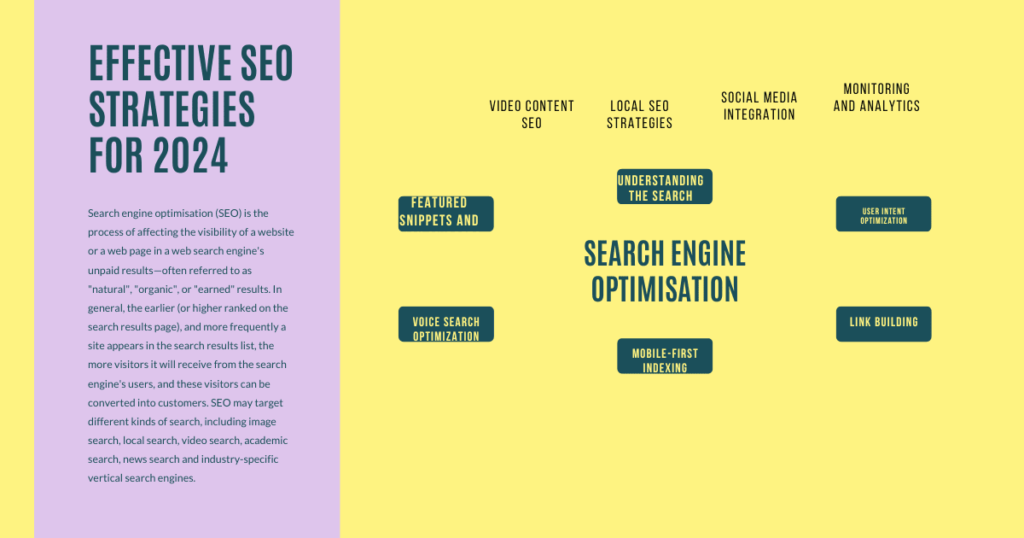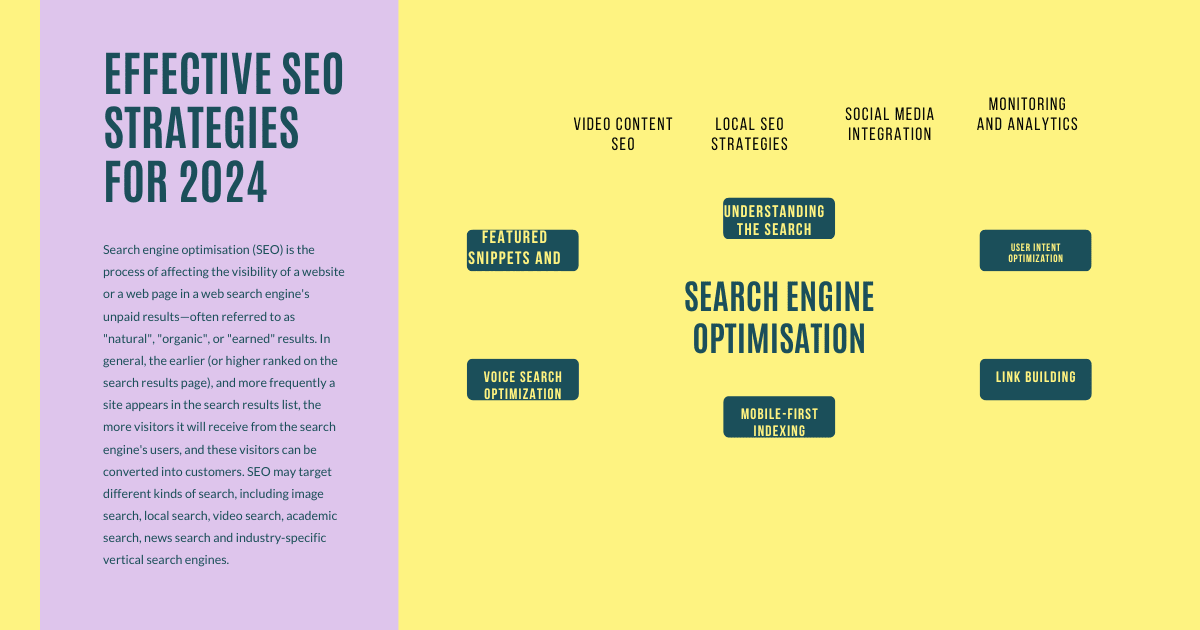Search Engine Optimization (SEO) is a pivotal element of digital marketing, essential for any business aiming to enhance its online presence. With the right strategies, you can improve your website’s visibility on search engines, attract more traffic, and drive conversions. This comprehensive guide explores key SEO strategies that are particularly effective for the US market.

Introduction
In an increasingly digital world, mastering SEO is crucial for businesses that want to succeed online. SEO involves optimizing your website to rank higher on search engine results pages (SERPs), which is especially important in the competitive US market. By implementing effective SEO strategies, you can ensure your website stands out, attracts more visitors, and drives business growth.
In this guide, you’ll learn about essential SEO strategies, including keyword research, on-page and off-page optimization, technical SEO, and local SEO. These strategies will help you achieve better rankings and increase your online visibility.
Keyword Research: The Foundation of SEO
Understanding the Importance of Keywords
Keywords are the terms and phrases that people use to search for information online. They are the foundation of SEO because they connect what people are searching for with the content you are providing. Effective keyword research allows you to understand your audience’s needs and tailor your content to meet those needs.
How to Conduct Effective Keyword Research
- Identify Seed Keywords: Begin with broad terms related to your business or industry.
- Use Keyword Research Tools: Tools like Google Keyword Planner, SEMrush, and Ahrefs provide data on search volume, competition, and related keywords.
- Target specific search queries to reach users who are further along in their research process. These longer, more detailed phrases typically have lower competition, making it easier for your content to rank well in search results. They often have higher conversion rates. For example, instead of targeting “SEO,” target “best SEO strategies for small businesses in the USA.”
- Analyze Competitors: Look at what keywords your competitors are ranking for and identify opportunities to outrank them.
On-Page SEO: Optimizing Individual Pages
Title Tags and Meta Descriptions
- Title Tags: Ensure each page has a unique, descriptive title tag that includes your primary keyword. Keep it under 60 characters.
- Meta Descriptions: Write compelling meta descriptions that summarize the page content and include relevant keywords. Keep them under 160 characters.
Content Optimization
- High-Quality Content: Create content that is informative, engaging, and valuable to your audience. Aim for depth and comprehensiveness.
- Keyword Placement: Naturally incorporate keywords into your headings, subheadings, and body text. Avoid keyword stuffing.
- Internal Linking: Link to other relevant pages on your site to improve user experience and help search engines crawl your site more effectively.
- Use of Headers: Use H1, H2, and H3 tags to structure your content and make it easier for search engines to understand the hierarchy of your content.
Technical SEO
- Prioritize a seamless mobile experience. Since a large chunk of your website traffic likely comes from smartphones and tablets, make sure your site is optimized for mobile viewing. This means ensuring easy navigation, clear text, and responsive design elements that adjust to different screen sizes.
- Page Speed: Optimize your website to load quicklyLeverage website speed testing tools like Google PageSpeed Insights to pinpoint areas for improvement. These tools can diagnose performance bottlenecks and offer specific recommendations to optimize your website’s loading speed.
- Secure Website (HTTPS): Having a secure website is a ranking factor and builds trust with your users.
- XML Sitemap: Create and submit an XML sitemap to search engines to help them index your site more efficiently.
Off-Page SEO: Building Authority and Trust
Link Building
Think of your website as part of a vast network of information. Backlinks act like citations, where other websites link to your content because they find it valuable and relevant to their audience. These links can then direct users to your website, boosting your online presence. They are a critical factor in SEO because they signal to search engines that your site is trustworthy and authoritative.
- Guest Blogging: Write articles for reputable sites in your industry to gain high-quality backlinks.
- Social Media Engagement: Share your content on social media platforms to increase visibility and attract backlinks.
- Local Citations: Ensure your business is listed in online directories and local listings with consistent information.
Social Signals
While not a direct ranking factor, social signals (likes, shares, comments) can drive traffic to your site and indirectly influence your SEO efforts. Engage with your audience on social media to build a loyal following and increase brand awareness.
Local SEO: Targeting Local Audiences
Importance of Local SEO
For businesses targeting a local audience in the USA, local SEO is essential. It helps you appear in local search results and attract customers in your area.
How to Optimize for Local SEO
- Google My Business: Create and optimize your Google My Business profile with accurate and up-to-date information.
- Local Keywords: Use keywords that include your location, such as “best SEO consultant in Los Angeles.”
- Maintain a consistent online presence by claiming and managing your business listings across relevant online directories and local search platforms. This ensures your business name, address, phone number (NAP) and other details are accurate and up-to-date across the web, making it easier for local customers to find you.
- Customer Reviews: Encourage satisfied customers to leave positive reviews on your Google My Business profile and other review sites.
Measuring and Analyzing SEO Performance
Key Metrics to Track
- Track your website’s organic reach. Organic traffic refers to visitors who discover your website through search engines like Google. Monitoring these visits helps you understand how well your SEO (Search Engine Optimization) efforts are performing in attracting potential customers who are actively searching for information or products related to your niche.
- Keyword Rankings: Track your rankings for target keywords.
- Backlinks: Keep track of the number and quality of backlinks to your site.
- Conversion Rate: Measure how many visitors are taking desired actions on your site, such as making a purchase or filling out a contact form.
Tools for SEO Analysis
- Google Analytics: Provides insights into your website traffic and user behavior.
- Unlock valuable insights with Google Search Console. This free tool from Google empowers you to monitor your website’s health and performance in search results. It provides valuable data on how users find your site, identifies potential technical issues, and helps you optimize your content for better visibility.
- SEO Software: Tools like SEMrush, Ahrefs, and Moz can help you track performance and identify opportunities for improvement.
Disclaimer
This content is for general informational purposes only and does not constitute professional advice. For specific situations, consult with an SEO professional.
Conclusion
Supercharge your website’s traffic potential with strategic SEO. By implementing well-crafted Search Engine Optimization (SEO) techniques, you can significantly enhance your website’s visibility in search results. This translates to attracting a wider audience of users actively searching for information or products related to your niche. By focusing on keyword research, on-page and off-page optimization, technical SEO, and local SEO, you can achieve better rankings and drive sustainable traffic to your site. Stay updated with the latest SEO trends and continuously optimize your efforts to maintain and improve your online presence. Feel free to share this content and leave your questions or comments below!
By following these guidelines, you can enhance your website’s SEO performance and achieve higher rankings on search engines, ultimately driving more traffic and conversions.
Need a digital marketing edge? Explore our digital marketing section for expert tips and tricks.
